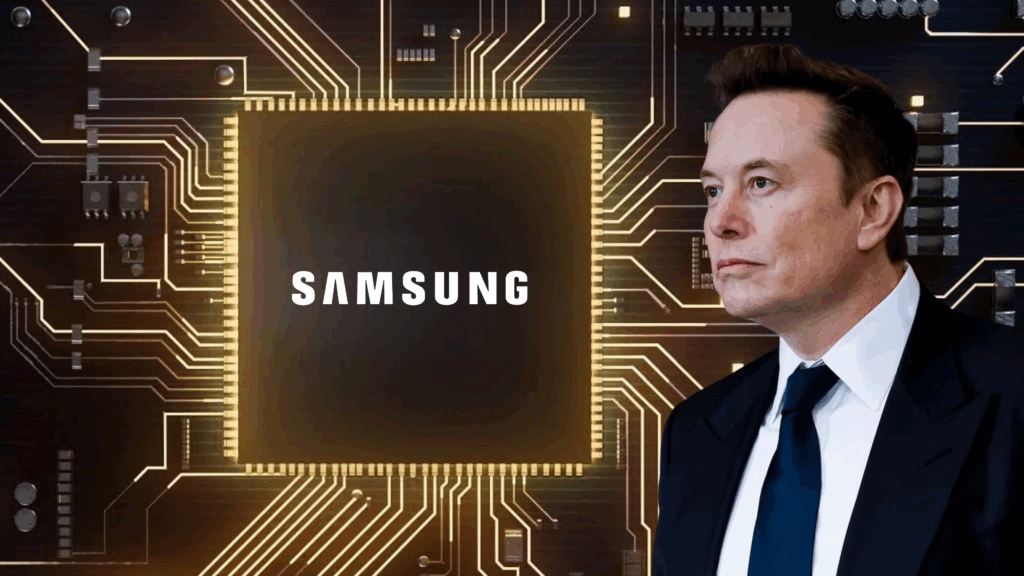
Tesla and Samsung Electronics have entered into a multiyear contract worth $16.5 billion. Announced in late July 2025. This deal sets the stage for Samsung to manufacture Tesla’s next-generation AI6 chips using its advanced foundry capacity, marking a pivotal moment for both companies in the context of growing demand for AI-enabled automotive technology
Recently, Samsung disclosed that it had secured a $16.5 billion semiconductor supply agreement with a “major global corporation,” to run through December 31, 2033. While the client was initially unnamed, Tesla CEO Elon Musk confirmed via a post on X (formerly Twitter) that Tesla is indeed the customer, and that Samsung will manufacture Tesla’s upcoming AI6 chip at its new fabrication facility in Taylor, Texas.
The contract begins in July 2025 and spans over eight years, ending at the close of 2033, providing a sustained and high-volume supply commitment.
Tesla’s use of custom AI chips—specifically the Full Self‑Driving (FSD) and now AI6 chips—drives its advanced autonomy capabilities. Scaling production via a dedicated chip supply stream ensures Tesla can roll out more powerful, efficient systems to its vehicles as it continues to push toward broader self-driving features.
Elon Musk emphasized that Tesla will assist Samsung in optimizing manufacturing throughput. He stated, “I will walk the line personally to accelerate the pace of progress,” highlighting Tesla’s direct involvement in production processes and quality control.
Since Samsung’s Texas factory is physically close to Musk’s residence, he noted the strategic advantage of proximity in monitoring operations and accelerating progress on chip output.
Samsung’s foundry division had been struggling—reportedly incurring losses exceeding 5 trillion won (USD 3.63 billion) during the first half of 2025. Securing the Tesla deal provides a much-needed boost, with analysts estimating it could reduce operational losses significantly and help fill existing production capacity.
As Samsung’s reliance on logic-chip clients like Apple and Nvidia diminished—major clients in TSMC’s roster—the company has lost market share in contract manufacturing. This deal with Tesla is seen as a vote of confidence and may help reposition Samsung in the upper tier of global chipmakers.
South Korea is currently engaged in negotiations with the US over potential tariffs—particularly a proposed 25% tariff on chip exports. A strong partnership with Tesla and increased chip production at Samsung’s Texas fab could align with South Korea’s broader strategy of fostering US industrial and trade partnerships.
Tesla’s AI6 chip is expected to be more advanced than Samsung’s current AI4 output. However, analysts point out that the contract likely does not involve 2-nanometer technology, which Samsung is still developing amid yield challenges. The production is likely on mature but advanced node processes—such as 4 nm or 5 nm—enough to deliver significant AI performance for Tesla’s applications.
Samsung continues to lag behind TSMC in contract foundry market share—TSMC held about 67.6% in Q1 2025, while Samsung’s share slipped to around 7.7%. This Tesla deal could help Samsung regain some footing in the AI and automotive chip markets where demand is accelerating.
Following the announcement, Samsung’s shares jumped by 3.5–4%, hitting their largest daily gain in nearly a month, as investors reacted to the strong confidence signal and potential for improved financial performance.
The $16.5 billion contract reportedly represents approximately 7.6% of Samsung’s projected 2024 revenue, suggesting a meaningful infusion of high-volume foundry income over many years.
Analysts estimate the deal could trim Samsung foundry’s losses significantly—by helping fill capacity and stabilize operations. This partnership may function as a stepping stone toward future deals with other tech clients seeking foundry services outside of TSMC.
This contract exemplifies the rapidly growing demand for advanced automotive chips—needed for EVs, autonomy, in-vehicle AI, and sophisticated hardware control systems. Tesla’s proactive strategy places it at the forefront of in-house AI chip design and supply chain resiliency.
For Tesla, securing long-term supply outside of TSMC reduces dependency on a single foundry. For Samsung, this is a much-needed anchor client that can drive improvements in manufacturing processes and reveal its capabilities to other potential logic-chip customers.
The deal aligns with South Korea’s push for strategic ties with the United States. Samsung’s US presence in Texas and collaboration with Tesla soften potential trade frictions—especially amid tariff negotiations involving advanced semiconductor exports from South Korea.
Samsung’s ongoing difficulty scaling to 2-nanometer chips suggests the agreement may rely on older nodes, potentially limiting performance gains compared to TSMC’s cutting-edge facilities. Samsung’s Texas plant has faced delays and struggled to land large clients. Meeting Tesla’s performance, timing, and volume expectations will be essential for success. TSMC may pursue deeper ties with Tesla or other EV/AI companies, raising competition for Samsung to sustain momentum post-contract.
Tesla’s $16.5 billion contract with Samsung is consequential across multiple dimensions. For Tesla: it secures a long-term, high-capacity supply of critical AI chips, with direct involvement in optimizing production. For Samsung: it offers a marquee foundry client and potential turnaround for its struggling semiconductor manufacturing operations. For the chip industry: it highlights the escalating demand for automotive AI hardware and the shifting dynamics among foundry providers.
The deal not only underscores Tesla’s ambition to dominate in AI‑powered driving systems but also Samsung’s determination to redefine its position in global logic-chip manufacturing.
As the contract unfolds through 2033, it will serve as a bellwether for technological advancement, competitive strategy, and industrial partnerships across the US-Korea tech corridor.

